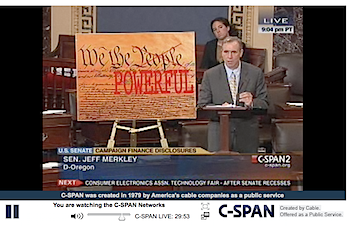Senate Democrats urge transparency after DISCLOSE fails
 |
| Whitehouse shows citizen support |
After Republicans blocked debate on the DISCLOSE Act yesterday afternoon, Senate Democrats, led by Rhode Island's Sheldon Whitehouse, held the floor for over six hours to discuss the problems with secret money in elections and the merits of their proposal to require large-dollar donors to be identified.
Around midnight, Whitehouse took to the podium to deliver a summation, and he did it in a style that recalled his years as a prosecutor, reminding Americans that they should be asking who benefits, and suggesting attention to the motives of donors who wished to hide. "Americans get that you don't spend this kind of money without a motive," said Whitehouse.
Questioning motives was a recurring theme all night, as sponsors of the bill (text here) argued that the only reason for secrecy was an agenda at odds with the interests of everyday Americans. Said Ohio's Sherrod Brown, "Under Citizens United what we have is a sale. It's not an election."
 |
| Oregon Sen. Jeff Merkley shows the new Constitution |
Oregon's Sen. Jeff Merkley had a simple graphic that captured the essence: a rewrite of the Constitution for the post-Citizens United world. With $1Billion in secret money bankrolling campaign ads this year, he argued, the voice of the people has been diluted. "It's become 'We the powerful,'" said Merkley. Whitehouse argued that it turned free speech on its head: "You [now] have a constitutional right to listen when big money speaks." RI's other senator, Jack Reed, put it plainly: "The Supreme Court created a situation where effective speech is no longer free."
But really, what's so terrible about corporations spending unlimited amounts of money on negative ads? At the most fundamental level, it tilts the playing field. "A few can go into a corner and be cloaked," said Sen. Bob Casey (D-PA). "Americans want robust debate," said Reed, not candidates who "engage through surrogates." Mark Pryor (D-AR) compared it to the contributions of everyday voters, who might give a candidate $5, or $20, or maybe a hundred dollars, compared to a corporation willing to sink $1M into a super PAC. "I don't want the secret voice to be 10,000 times louder," said Pryor.
And the solution is a simple measure: disclosure. Require every entity (and that means everyone, whether corporations, super PACs, unions, billionaires, NGOs, everybody) that drops $10K on advocacy to report the names of donors. No limits on speech, no caps on spending, just disclosure.
In addition to just being fair ("If the average citizen is subject to disclosure, why not a super PAC," asked Bob Menendez (D-NJ)), putting a name to donations encourages responsibility. Sen. Jeanne Shaheen (D-NH) quoted Justice Antonin Scalia, "Requiring people to stand up in public for their political acts fosters civic courage."
In fact, the Supreme Court, in Citizens United, specifically anticipated the need for disclosure to ensure that unlimited dollars wouldn't taint the electoral process. "The Supreme Court said that we can force these organizations to disclose," said Sen. Al Franken (D-MN), quoting from Justice Kennedy's majority opinion. "My colleagues and I have simply taken Justice Kennedy's words to heart." The purpose of the DISCLOSE Act, said Reed, was simply to "give the Court what it thought it had."
Senate Democrats plan another attempt today at breaking the cloture logjam and getting the Republicans to actually debate the bill. It's worth noting which senators are siding with the American people, and which are siding with the big-money special interests.
If you have a few minutes, it's worth reading the whole Twitter stream from last night.
Full disclosure: I'm a supporter of transparency and Sheldon Whitehouse.